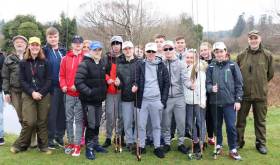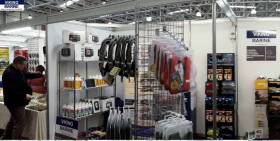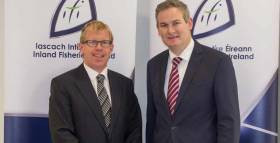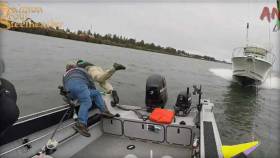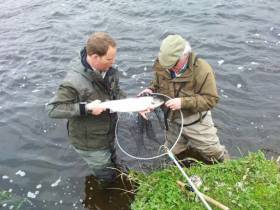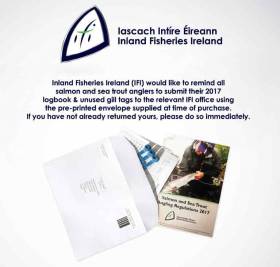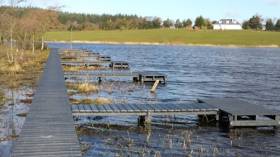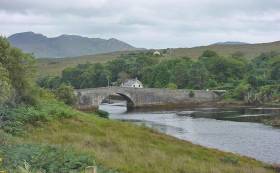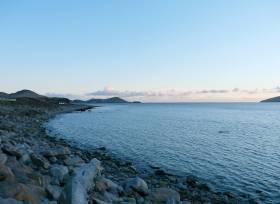Displaying items by tag: angling
Inland Fisheries Ireland was delighted to attend the recent graduation ceremony and presentation of certificates to transition year students from Christian Brothers School (CBS) James Street, Dublin 8, after their recent successful completion of the second annual Angling Adventure flyfishing project, run in co-operation with eir and IFI.
Following the success of the programme in 2017, it was expanded this year to cover even more elements of fishing including coarse, pike and fly fishing, casting, fly tying, and environmental awareness.
The 13-week programme with IFI and the inner-city Dublin school has been very generously funded by eir under its remit of corporate social responsibility to communities and the environment.
Alongside classroom workshops delivered by experts in the field of fly tying and casting, field trips were organised at Lough Ramor, Virginia, Co. Cavan, Annamoe Trout Fishery in Co. Wicklow and the K Club’s pike fishing lakes in Co. Kildare, as well as an environmental field trip to the River Dodder in Dublin.
Attendance throughout the course was excellent and pupils were fully engaged with the course content and their mentors. The programme ran from January to April and it is hoped that the participants will have reached a standard high enough to obtain the President’s GAISCE Award.
“This project has huge benefits for all partners,” said Ciaran Ward, organiser of the programme for eir. “From our perspective, eir sees this project as a good way to demonstrate being a good corporate citizen. Through teaching these teenagers fishing skills, hopefully, some may go on to become future custodians of our rivers and lakes benefitting the participants and, for IFI, it is an opportunity to introduce more young people to angling.”
Brian Beckett, Director of the Eastern River Basin District, Inland Fisheries Ireland, said: “A contributing factor to the success of this eir/IFI initiative is the tremendous support from the angling community, who have given freely of their time through the running of the programme to pass on their knowledge of particular disciplines of angling. And, of course, an added benefit is that the mentors on the programme are positive role models for the students. It is also hoped that these youngsters will put their newly learned fishing skills into practice and take up a hobby that can be lifelong.”
Viking Marine Among Marine Trade Exhibits at Dublin Angling Show
Leading chandlery store Viking Marine is one of some of the leading boat dealers displaying at the Ireland Angling show this weekend in Swords, North Dublin.
The Dun Laoghaire and Wicklow based chandler is a repeat exhibitor at the two day show, based near Dublin Airport, where Stand B11 features Humminbird fish finders, Minn Kota electric engines, Boat Buddy cleaning products plus a wide range of lifejackets.
Other boat dealers familiar to Afloat.ie readers in Swords include BJ Marine, pictured below, MGM Boats and Yachtsman Marine Insurance.
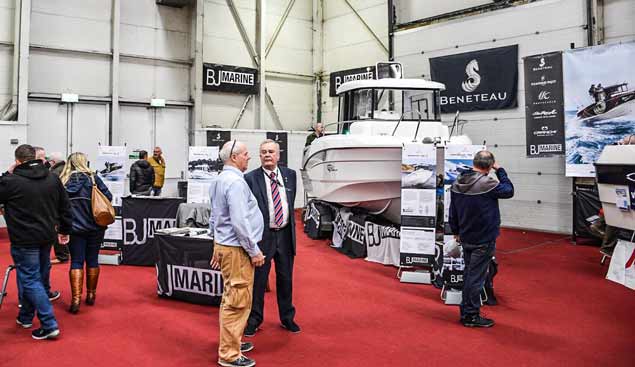 The new Beneteau Barracuda 6 on display by BJ Marine in Swords
The new Beneteau Barracuda 6 on display by BJ Marine in Swords
Sean Kyne TD, Minister with responsibility for the Inland Fisheries Sector today welcomed Inland Fisheries Ireland‘s announcement that, at a positive and constructive meeting of its Fish Farming Working Group, it was confirmed by IFI that they will continue to produce fish and make them available to angling clubs throughout 2018, and thereafter.
The Fish Farming Working Group is comprised of members of Inland Fisheries Ireland’s Board and Executive as well as the two main trout angling organisations, the Trout Angling Federation of Ireland (TAFI) and National Anglers Representative Association (NARA).
IFI also outlined its actions taken to date in relation to tendering for the design of a new fish farming facility and, at its subsequent January Board meeting held on the 31st of January, the Board agreed to proceed with a tender for this project. The Board had previously confirmed its commitment to developing a comprehensive strategy to meet current and future trout production needs, subject to securing the investment required.
Minister Kyne said: “The future success and development of the sector depends on the close co-operation and constructive approach of both IFI and the stakeholders, pulling together for the greater good. The fact that the Fish Farming Working Group has begun 2018 with such a positive meeting is very much to be welcomed and I look forward to hearing more, and being part of, similar productive dialogue over the coming months and years.”
The Minister also welcomed the Group’s discussions, in the context of the future advancement of the sector, on the wider development of youth angling generally and the potential for developing urban angling locations.
The next meeting of the Working Group is currently scheduled for late February.
Anglers Narrow Escape in Motorboat Crash VIDEO
US Anglers narrowly escaped certain injury when a motorboat collided with their small fishing boat. See video below.
An Oregon fisherman whose dramatic escape from an oncoming motorboat was caught on video is suing the driver of the other boat for $372,500.
Bryan Maess alleges the other driver was distracted by cell phone use during the accident.
Maess filed the lawsuit this month. The Hermiston police officer and two friends were forced to jump into the Columbia River to avoid being crushed by the oncoming speeding boat in August 2017.
A GoPro video of the crash, posted on the magazine Salmon Trout Steelheader's Facebook page, has been viewed more than 250,000 times since Jan. 16.
78 Rivers Open for Salmon Angling in 2018
Mr. Sean Kyne T.D., Minister with responsibility for the inland fisheries sector, has approved a suite of regulations and bye-laws that will govern the wild salmon and sea trout fisheries in 2018. These will come into effect from Monday 1, January 2018.
Minister Kyne said “In all, 78 rivers will open for angling activity in 2018 and this will provide opportunities for all to share this important natural resource on a sustainable basis. 42 of these rivers will be fully open with a further 36 for angling on a “catch & release” basis. I had asked Inland Fisheries Ireland to carry out a full review of the Catch and Release element of fisheries management policy ahead of the 2018 season and this has resulted in an additional 12 rivers open on a Catch and Release basis which otherwise would have been closed.”
Minister Kyne had received management advice from IFI in relation to over 140 genetically individual wild salmon stocks in Ireland, in advance of setting out the legislation for 2018. This advice was also made available as part of a public consultation process. This was based on the scientific assessment of the current status of all stocks carried out by the independent Standing Scientific Committee on Salmon. This committee comprises scientists from a range of organisations.
Over 130 submissions were considered as part of the public consultation process. Based on this the Minister has introduced conservation measures for the management of the wild salmon and sea trout fishery in 2018.
Management advise supported by scientific assessment of rivers/estuaries/harbours is that:-
78 Rovers should be open for angling of which
42 rivers should be open as a surplus of fish has been identified in these rivers;
36 rivers should be classified as open for “catch and release” angling;
68 rivers should be closed as they have no surplus of fish available for harvest.
Summary of main changes to the management of the wild salmon fishery in 2017
|
Fishery District |
River |
2017 |
2018 |
|
Dundalk |
Glyde |
Open |
Catch And Release |
|
Dundalk |
Dee |
Catch And Release |
Closed to 30 April/Catch And Release from 01 May |
|
Wexford |
Slaney |
Closed |
Closed to 30 April/Catch And Release from 01 May |
|
Kerry |
Ferta |
Open |
Catch And Release |
|
Kerry |
Inny |
Open |
Catch And Release |
|
Bangor |
Glenamoy |
CATCH AND RELEASE |
Open |
|
Bangor |
Shramore |
Closed |
Catch And Release |
|
Ballyshannon |
Eske |
Closed |
Catch And Release |
|
Ballyshannon |
Owenwee (yellow) |
Closed |
Catch And Release |
|
Letterkenny |
Owenea/Owentocker |
Open |
Catch And Release |
|
Letterkenny |
Gweedore (Crolly) |
Open |
Catch And Release |
|
Letterkenny |
Tullaghobegley |
Closed |
Catch And Release |
|
Letterkenny |
Leannan |
Catch And Release |
Closed to 30 April/Catch And Release from 01 May |
- Wild Salmon and Sea Trout Tagging Scheme (Amendment) Regulations S.I. No. 602 of 2017
These regulations provide for, the quotas of fish that can be harvested by commercial fishing engines and rod and line from those rivers identified in Schedule 2. The Regulations also provide for the use of brown tags in specified rivers which are identified in Schedule 4.
- Angling Byelaw No. 955, 2017
This Bye-law prohibits the use of any fish hooks, other than single barbless hooks, and also prohibits the use of worms as bait in angling for all species of fish in the waters specified in the Bye-law.
- Conservation of Salmon and Sea trout (Bag Limits) Bye-law No. 956, 2017
Provides for an annual bag limit of 10 fish being either salmon or sea trout (over 40 cm) per angler and provides for a season bag limit of 3 fish in the period 1 January to 11 May, a daily bag limit of 3 fish from 12 May to 31 August and a daily bag limit of 1 fish from 1 September to the end of the season. The Bye-law also provides for the use of single barbless hooks and prohibits the use of worms as bait once the specified numbers of fish have been caught in the specified periods.
- Conservation of Salmon and Sea trout (Catch and Release) Bye-law No. 957, 2017
Provides for catch and release in respect of salmon and sea trout (over 40 cm) in rivers that are meeting at least 50% of their Conservation Limit as mentioned in the Bye-law. The Bye-law also provides for the use of single barbless hooks and prohibits the use of worms as bait in angling for salmon and sea trout over 40 cm
- Conservation of Salmon and Sea Trout (RiverSuir) Bye-law No. 958, 2017.
This Bye-Law provides for catch and release in angling for salmon (any size) and sea trout (over 40cm) in the RiverSuir (including the waters of the Rivers Clodiagh, Lingaun and Blackwater) and also prohibits the use of worms, prawn, shrimp or any other crustacean, or artificial forms thereof, as bait and any fish hooks other than single barbless hooks during the period 17 March to 30 Sept, 2018.
- Conservation of Sea Trout Bye-law No. 959, 2017
This Bye-law provides for a daily bag limit of 3 sea trout (less than 40 cm in length) and provides for the use of single barbless hooks and prohibits the use of worms as bait once the specified number of sea trout have been caught.
- Conservation of Salmon and Sea Trout (Closed Rivers) Bye-law No. C.S. 323, 2017
Prohibits the taking or attempting to take by rod and line salmon and sea trout (over 40 cm) in the rivers specified in the Bye-law.
Inland Fisheries Ireland: Reminder to All Salmon & Sea Trout Anglers
Inland Fisheries Ireland (IFI) would like to remind all salmon and sea trout anglers to submit their 2017 logbook and unused gill tags to the relevant IFI office using the pre-printed envelope supplied at time of purchase.
Your contribution to the management of our wild Atlantic salmon stocks for 2018 is very important. 69% of anglers returned their logbook and unused tags last year.
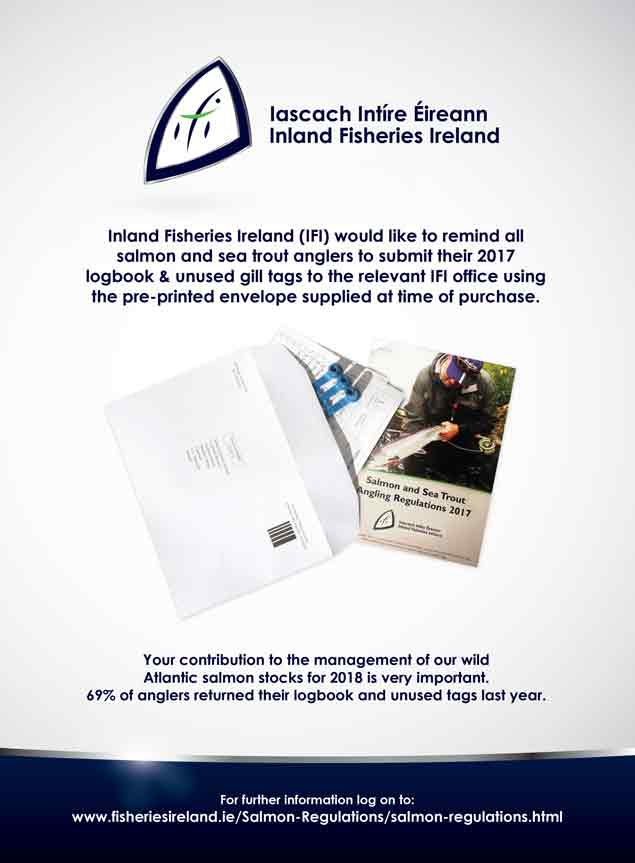
For further information click here
State Fisheries Tender Process Now Open For 2018
#Angling - Angling clubs have until this Friday 22 December to submit their tender for rivers opening in the New Year in the State Fisheries Tender Process for 2018.
Tenders will be accepted up until Friday for rivers opening in January 2018, and until 12 January or the remainder. Proof of postage on or before these date will be accepted.
The list of available fisheries can be found on the Inland Fisheries Ireland website. To tender for one or more fisheries, fill out the Condition of Tender and Application Form.
Mark your envelope TENDER APPLICATION and send it to Paul O’Reilly, Business Development, Inland Fisheries Ireland, 3044 Lake Drive, Citywest, Dublin 24.
If your angling club is interested in a longer term licence, fill out the relevant section on your form and IFI will get in touch. In the meantime, the ‘per year’ licence fee should be tendered.
For any queries relating to State Fisheries or the 2017 tender process, contact Paul O’Reilly at [email protected] or at 01 884 2600.
In addition, all clubs who held a licence on a State fishery during the 2016 season will need to fill out an End of Year Report Form and return it to IFI at the above address by 30 December.
End of Year reports may of course be posted together with tender applications, though no envelopes marked ‘TENDER APPLICATION’ will be opened until after the closing date for applications. Any tender cheques enclosed will also not be acknowledged until after 12 January.
#Angling - Sean Kyne TD, Minister of State with responsibility for Inland Fisheries, has today (Wednesday 9 August) welcomed a new €2 million funding call from Inland Fisheries Ireland (IFI) for angling projects and conservation initiatives.
The funding call, which consists of three separate funding streams, will help ensure that Ireland’s fish stocks and angling infrastructure are protected and enhanced into the future.
The 2017 IFI funding call is made up of the following funds:
- Salmon Conservation Fund to a maximum of €500,000
- Midland Fisheries Fund of €50,000
- National Strategy for Angling Development Fund (NSAD) €1,500,000
“As minister with responsibility for Inland Fisheries, I have ensured that significant funding under the National Strategy for Angling Development was available from my Department in 2017 to help Inland Fisheries Ireland develop a wide ranging investment initiative,” said Minister Kyne.
“I welcome the fact that the funding programme is rooted in community-led actions and I support Inland Fisheries Ireland in its enhancement plans. I also want to encourage angling bodies, community groups and local authorities to take up the funding opportunity and meet the development challenge at local, regional and national level.”
IFI is inviting applications for funding for projects across a number of areas, from fisheries habitat enhancement and sustainable development works to marketing and promotional projects for angling.
Applications are invited from groups, associations, clubs, local authorities or other appropriate bodies looking to improve Ireland’s fisheries resource.
IFI chief executive Dr Ciaran Byrne said: “Today’s announcement sees Inland Fisheries Ireland make over €2 million available to communities nationwide, for projects which will help contribute to an accessible and sustainable world class inland fisheries and sea angling resource for all.
“We want to ensure that we continue to invest in conservation, while also developing our angling offering in Ireland. While the National Strategy for Angling Development funding stream focuses on improving angling access with a view to attracting more domestic and overseas anglers to the pursuit, the Salmon Conservation Fund and Midland Fisheries Fund re-invest the contributions of anglers into valuable initiatives which a view to promoting the recovery of salmon stocks and habitats and supporting sustainable development works in the Midlands respectively.”
IFI will hold regional information workshops for those interested in applying for funding with a view to giving participants a better understanding of the various funding streams and how they can apply via an online system.
The workshops will take place at the following locations and dates (7pm each date unless otherwise stated):
- Tuesday 29 August - Clonmel Park Hotel, Clonmel, Co Tipperary
- Wednesday 30 August - Castle Hotel, Macroom, Co Cork
- Thursday 31 August - Maldron Hotel, Southern Ring Road, Roxboro, Limerick
- Monday 4 September - CityNorth Hotel, Gormanston, Co Meath
- Tuesday 5 September - Great National Hotel, N26 Dublin Road, Ballina, Co Mayo
- Wednesday 6 September - Menlo Park Hotel, Headford Road, Co Galway
- Tuesday 12 September - Harvey's Point Country Hotel, Lough Eske, Donegal Town
- Thursday 14 September - Athlone Springs Hotel, Monksland, Athlone, Co Roscommon
- Tuesday 19-Thursday 21 September (all day) - National Ploughing Championships, Screggan, Tullamore, Co Offaly
Members of the public who will be attending the workshops are asked to RSVP to [email protected], indicating which workshop they will be going to along with their name and contact details.
The closing date for applications to IFI’s 2017 funding call is Friday 13 October. For more information and to apply, see the IFI website HERE.
Innovative Fish Counter Opens On Donegal’s River Lackagh
#Angling - Sean Kyne TD, Minister of State with responsibility for Inland Fisheries, has officially opened a new fish counter facility in the designated spring salmon fishery on the River Lackagh.
The project, which was devised and delivered by Inland Fisheries Ireland, was completed in recent months and will provide important data for the future management of spring salmon, grilse and sea trout stocks for the River Lackagh catchment, which incorporates Lough Beagh, situated in Glenveagh National Park.
This major infrastructural project, which was funded under IFI’s Salmon Conservation Fund, includes installation of a crump weir, Logie fish counter and access road to the Lackagh River at Creeslough, Co Donegal.
The counter will provide verifiable, accurate data on the size, duration and timing of fish migration through the fishery.
The River Lackagh counter project was developed by IFI in response to closure of the River Lackagh salmon fishery in 2007, when scientific advice indicated that salmon stocks had fallen to below their conservation limit.
The salmon fishery remained closed to enable fish stocks re-build until 2013 when electrofishing surveys confirmed that juvenile salmon stocks had recovered sufficiently to allow for the re-opening of the salmon fishery on a ‘catch and release’ basis.
IFI says the new counter will be a valuable addition to its national suite of index counters and represents the organisation’s first counter on the north Donegal coast.
Minister Kyne said he is “delighted to officially open this fish counter which will help protect fish stocks in the area. Angling is a valuable asset to local communities here in Donegal. This development will help us ensure the sustainability of fish populations for future generations.”
IFI chief executive added: “This fish counter provides real time data on fish stocks in the fishery and allows us to adapt to changing stock levels. This is crucial both from a conservation and economic viewpoint as this fishery contains valuable wild fish populations.
“I would like to acknowledge all our partners in this project who recognised the importance of this project and worked with us to delivery this facility for the local area.”
Angling in Ireland currently contributes €836 million to the Irish economy annually, supporting upwards of 11,000 jobs which are often in rural and peripheral communities.
IFI’s National Strategy for Angling Development aims to ensure the sustainable development of the natural angling resource in a conservation focused manner. If realised, the strategy could help increase the economic contribution of angling by €53 million annually and support 18,000 jobs.
IFI collaborated with several partners on the River Lackagh project including Donegal County Council, the National Parks and Wildlife Service (NPWS) and ESB Networks. IFI also acknowledges the assistance of Creeslough & District Angling Association, owners Hillary Keegan and John Coyle and service providers WD Buchanan & Co Ltd, H Harkin Plan Hire Ltd and Source Civil Ltd.
Waterville Locals & Business Invited To Info Event On Opportunities In Angling Tourism
#Tourism - Waterville Lakes and Rivers Trust is hosting an information event on opportunities in angling tourism for business owners and the public in Waterville and surrounding areas later this month.
The event, which takes place at The Sea Lodge in Waterville, Co Kerry on Thursday 27 April at 7.30pm, will focus on sharing results from a recent economic survey carried out in Waterville among angling tourists to the area.
The research reveals some key opportunities for business and service providers in the locality.
The Waterville Anglers Survey queried 207 anglers visiting the area and found that on average, angling visitors spend €644 per fishing trip, or €114 per day.
The impact of this expenditure is far reaching across the local community, with €451 spent on non-angling items such as accommodation, restaurants/cafés and groceries, and €193 of angling expenditure on items such as angling guides, boat hire and equipment.
This daily spend of anglers in Waterville (€114) far exceeds the spending of non-angling visitors to Ireland. Fáilte Ireland’s Tourism Facts Report 2015 cites expenditure of non-angling visitors and holiday makers at €68 and €89 respectively per person per day in 2015.
The research, which was carried out by Inland Fisheries Ireland with Waterville Lakes and River Trust, highlights the significant recreational and economic value of the fisheries resource to the area.
Rod Robinson, spokesperson for Waterville Lakes and Trust, said: “Waterville is a popular destination for anglers and this research shows us the huge economic contribution they make to Waterville and the potential opportunity which exists for the community.
“We are inviting the public, business owners and tourist operators to come along and hear more so that together we can grow our offering around the fisheries amenity.”
Suzanne Campion, head of business development at Inland Fisheries Ireland, added: “We know at a national level that the fisheries resource contributes €836 million to the Irish economy annually but this local research also tells us that there is significant value of angling tourists to this community.
“We also note that the research once more confirms that angling visitors spend more than non-angling tourists and that they visit outside of the traditional tourist season, supporting local businesses and jobs while doing so.”
The information event is open to all to attend. For more details, contact Rod Robinson at Waterville Lakes and Trust via email at [email protected].


























